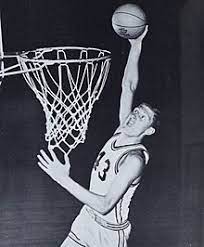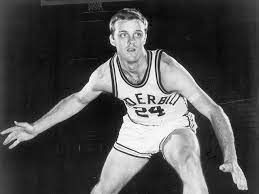Darius Garland may be his on his way to becoming the best NBA player to ever come out of Vanderbilt…but he has not yet caught Clyde Lee. Clyde was a star at Vanderbilt back in the 1960s, setting several school records including most points in a season and most rebounds in a game. He helped win the school’s 1st SEC title in 1965 and was named SEC POY for 2 years in a row in 1965/1966. He was drafted 3rd overall by San Francisco in 1966, made the NBA Finals in 1967, and played in the 1968 All-Star Game. HoopsHD’s Jon Teitel got to chat with a trio of Clyde’s college teammates (John Ed Miller/Jerry Southwood/Bob “Snake” Grace) about their 1965 NCAA tourney run and Clyde’s great rebounding. Today marks the 56th anniversary of Clyde’s NBA debut on October 21, 1966, so we take this time to reflect on his remarkable achievements.
Clyde was born/raised in Nashville: what made him choose Vanderbilt? The 1st time I saw him was when when our coaches sent us to watch him play: I was a college freshman and he was a high school senior. He was the tallest guy on the court but was not very aggressive. I looked at my teammate (Snake) and commented that Clyde needed to step it up a bit. He got a lot more aggressive the following year because he had to go up against Snake every day in practice! Clyde is 1 of the nicest people you will ever meet in your life. He was a super teammate and very shy in high school but eventually got over that.
As a sophomore he averaged 18.8 PPG/15.6 RPG: how was he able to come in and dominate right from the start? He had a pretty good supporting cast and was a great team player. Everyone on the team pulled together and wanted him to succeed so we fed him the ball a lot and he was good at sharing it with us. He was 6’9”, which was pretty tall back then, and had some nice moves and could score over people. He was “basketball-smart” and knew how to play team basketball: we were taught how to box out, pick and roll, etc. He was a quick learner who could run the court and catch the ball. We were a great team to watch.
In the 1965 NCAA tourney he had 28 PTS/20 REB in a 2-PT loss to top-ranked Michigan: how close did he come to pulling off the upset? We led the whole game and were right there at the end but there were several issues. By early in the 2nd half Clyde/Snake had both picked up their 4th fouls, which limited their defensive prowess/aggressiveness. Our guard who was defending Cazzie Russell fouled out and there was an erroneous walking call which gave the ball back to Michigan. We should have had the rebound off of a missed FT but the ball took a weird bounce and the Wolverines got it so we had to foul them twice. It was a tough 1 but we did not play our best game…and the refs did not help us with their block/charge calls. The Wolverines were a much more physical team and outweighed us at every position: they looked like NFL linebackers!
He was named All-American/SEC POY in both 1965/1966: what did it mean to him to receive such outstanding honors? It was no surprise: he earned those awards but was a shy team player who did not brag about how great he was. He was the best player who did the most for his team so he deserved those awards.
In the spring of 1966 he was drafted 3rd overall by San Francisco (1 spot behind Dave Bing): did he see that as a validation of his college career, or the realization of a lifelong dream of reaching the NBA, or other? He was very proud to get drafted but he was a regular guy so I do not know that it was a lifelong dream of his. The draft was very short back then and I never recall him mentioning a desire to play pro basketball. Back then he only made about $25,000 as a rookie: today it would be closer to $4 million!
He made the 1967 NBA Finals as a rookie and faced a Philadelphia team that set a then-record for most regular season wins in NBA history with 68: where does that 76ers team with 4 future Hall of Famers in its starting lineup (Wilt Chamberlain/Billy Cunningham/Hal Greer/Chet Walker) rank among the greatest that you have ever seen? I went to see him play in Baltimore but found out that he was back home due to an injury. I remember that Philly team and they were very good. Clyde told me once that he guarded Wilt by pushing him in the back the whole game and never got called for a foul. He said that Wilt was the tallest person he had ever seen.
In the 1968 All-Star Game he had a game-high 11 REB in 18 minutes off the bench for the West in a 20-PT loss to the East: how was he able to play his best against the best? That was just Clyde: he would always go out and give his best. 1 of the few times I ever saw him get mad was during a game against Tulane in New Orleans. They had a 7-footer who hit Clyde in the face during a jump ball…and the next time down the court he just took it to the rim and dunked it right over the big man! He was prepared for everything and just did what he was taught. It is a continuation of what he did in high school: he worked at it and made himself better because he was going to be the best player that he could be.
During his 10-year NBA career he averaged 10.3 RPG, which remains top-50 in NBA history: what was his secret for being a great rebounder? I think it was a combination of several factors. San Francisco already had guys like Nate Thurmond/Rick Barry/Al Attles/Jeff Mullins: Clyde’s job was to defend the best big man on the other team and rebound while the other guys scored. He was great at boxing out/rebounding but that was his big job on that team. He stuck to the basics and was darn good for a decade. He was a really good rebounder at every level.
After retiring from pro basketball he returned to campus to teach yoga classes and work as a radio color commentator for basketball games: how much did he mean to the school, and how much did the school mean to him? We had dinner last night with a woman who was 1 of his yoga students and still remembers him! The school means a lot to him and vice-versa: they would love to have him show up to every basketball game but he now lives out in Las Vegas. He did not want to create a lot of attention but he knew that at 6’9” everyone would look at him whenever he walked into a room. He is still very supportive of Vanderbilt and always will be. He also worked with the golf team including a young man named Brandt Snedeker: everyone loved him. I took some yoga classes from him and still do those exercises today.
In 1995 he was inducted into the Tennessee Sports Hall of Fame and in 2008 he was named to the Vanderbilt Athletics Hall of Fame as part of its inaugural class: when people look back on his career, how do you want him to be remembered the most? As 1 of the nicest people you will ever meet: great character, great basketball player, and a terrific person/friend. He does not want the spotlight for himself: he always said that the team belonged in the spotlight. He was humble back then and remains so today.




